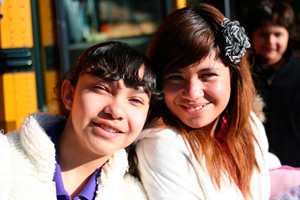
MORMON LAKE — The epic, one-on-one sand volleyball match between Harry Parks and Daniel Quiroz was over before it began. Quiroz, cheered along by his peers, whipped Parks 15-9.
Parks has been coaching Special Olympics for Sunnyside School District in Tucson for decades. Quiroz is one of his athletes.
Each year, more than 50 student athletes make the four-and-a-half-hour journey to St. Joseph Youth Camp, which is run by the Arizona Knights of Columbus. The Knights defray costs for the athletes.

The Knights have been running the camp since 1950 and want children from all ethnic, developmental and socio-economic backgrounds to have an authentic camp experience. This past summer, the camp was full for the first time in years.
“I want the camp to be used more,” said Rick Large, president of the board of directors and a member of the Fr. Marcel Salinas Council 11536 in Mesa. A full camp for four weeks isn’t good enough for Large, so he added another week this summer. He sees a lot of potential for growth.
The Knights of Columbus, from their founding by Fr. Michael McGivney, have been dedicated to serving children, orphans and widows. Fr. McGivney founded the fraternal benefit society in New Haven, Conn. in 1882, a time when Irish Catholics were being discriminated against because of their religion.
You won’t find discrimination at St. Joseph’s, where the memorable match between Parks and Quiroz took place. Parks talked trash to Quiroz for a good 20 minutes before taking it to the sand volleyball court.
“You? Oh, no way, Daniel,” he said. “I could beat you with my eyes closed. It wouldn’t be a fair match, Daniel, it just wouldn’t be right.”
Quiroz didn’t back down. While he seemed at a loss for words, he got up in Parks’ face, grabbed the volleyball, and pointed to the court. His peers and other coaches cheered him on.
“You can do it, Daniel!” they shouted.
“Oh come on!” Parks cried back. “I can take a nap and still beat Daniel. Give me a break.”
Quiroz beat Parks so badly, some onlookers might have suspected that Parks threw the match. His friends took turns hugging Quiroz after the final point.
The camp, 30 miles outside of Flagstaff, isn’t just for kids with special needs. Every summer, children, teenagers and young adults square off on the same sand, sleep in the same cabins and tell scary stories around the same fire pit.
The camp opens in June for teens, some of whom will be chosen to be counselors for younger campers later in the summer. Boy Scouts, parishes and even the Highway Patrol also make use of the camp, which is available for rental. The camp, which has a small chapel, is used for retreats, weddings and family gatherings.
Over the summer, kids ride horses, take long hikes and kayak. There’s mountain biking and arts and crafts, too. Cell phones, radios, iPods, matches and curling irons are strictly prohibited.
The fresh mountain air is a nice break from the hot summer. Parents who were once campers at St. Joseph’s years before send their children. Some campers meet life-long friends.
Meaningful connections have been happening for years among the Sunnyside athletes and coaches as well.
“When they play together, they bond,” Parks said of the athletes. “I’ve seen a lot of these kids grow up. It goes beyond sports. Being on a team engages them. It helps them stay in school.”
Special needs kids want to be accepted and are often tempted to join a gang. Sports are an alternative.
“Most of them choose us,” said Barbara Zuniga, a retired teacher who’s been involved with special needs students for decades. If you want to play on the team, you can’t be in a gang.
“You become very close to them,” Zuniga said. “We’re family.”
The special needs students stick up for each other at school if other kids pick on them. One young man, who was born without arms, comes to the camp. It isn’t a problem because the other students help him.
“It’s fun,” Erick Vazquez, 17, said of the camp. “I like it. I play basketball. It’s good.”
Julian Lopez, 18, who plays on a team with Jones and Vazquez, said he likes going to camp because “It’s laid back. It’s chill.” Coaches used to have an elaborate program of activities, but the students said they preferred a slower pace so they could just spend time together.
“Most of these kids don’t get out of town,” Zuniga explained, noting that they’re from a poor school district. Many come from struggling families who don’t have time to give them the attention they need.
“They start asking about camp when school starts. ‘Are we going to roast marshmallows?’”
The answer is yes.
“We couldn’t afford to pay for it were it not for the Knights,” she said. “Some of the kids just have more self-confidence when they leave here. A lot of them haven’t been in the woods before.”
Beatriz Quiroz, Daniel’s mother, said camping brings joy to her son’s life. “When he’s with kids that are like him, he’s content. He’s not afraid to walk around here on his own. He knows it’s safe.”
Her son will never be able to go to a party on his own. Seeing him come alive at camp brought her to tears. “He’s delicate,” she said. “He has diabetes, high blood pressure. But here, he’s alive.”
– – –
St. Joseph’s Youth Camp
To learn more about St. Joseph’s Youth Camp, including how to send your child to have an authentic camp experience, visit the web: www.sjycaz.com.






